-
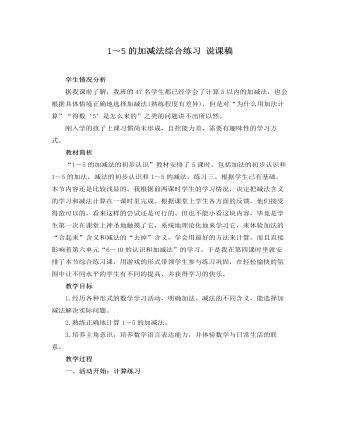
人教版新课标小学数学一年级上册1~5的加减法综合练习 说课稿
在组织教学和设计习题时,我考虑到了以下几点。1.培养“主角”意识,人人参与,人人提高。新理念下倡导自主学习,学生是学习的主人。本节课始终是学生在自主地解决问题、发现问题、解决问题。在教师的合作下,学生利用已有的知识经验,积极思维,提高了他们的分析综合能力,帮助他们掌握了解决数学问题的规律。同时,我力求让每个学生都体会到学习数学的快乐,在练习中,通过用手指表示得数,将式子列在自己的纸板上,小组交流,抢答等形式,让每个学生都动起来,都得到需要的数学知识。2.知识前后联系,融会贯通。在习题练习中,我注意多元化、开放化,需要学生将知识进行综合内化,来解决问题,这也是一种数学素养。比如决定上几号车厢,必须进行计算──统计──比较的思维活动;野生动物园情境列式中需选择条件,留有充分的思考空间;“海洋公园”情境中学生又初步有了两步计算的意念。3.充分利用小组合作学习的优势。
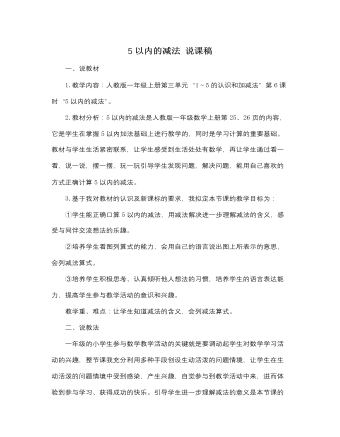
人教版新课标小学数学一年级上册5以内的减法 说课稿
一年级的小学生参与数学教学活动的关键就是要调动起学生对数学学习活动的兴趣,整节课我充分利用多种手段创设生动活泼的问题情境,让学生在生动活泼的问题情境中受到感染,产生兴趣,自觉参与到教学活动中来,进而体验到参与学习、获得成功的快乐。引导学生进一步理解减法的意义是本节课的重点,用肢体语言演示让学生扎扎实实的掌握3个方面的知识点:第一点要会说,能从图中找到与数学有关的信息,并能恰当地提出一个问题;第二点会数,能准确地数出原来有多少、去掉几个就是减几,去掉的这个数是从总数里去掉的;第三点会列算式,并让学生在此基础上创造性的根据算式来编一个故事,并提出问题,让学生在不知不觉中学会了举一反三,从而做到一通百通。 本节课我始终遵循这样一个教学原则,即知识的起点由低到高,由易到难,循序渐进,一步一步逐渐引导学生做到举一反三,一通百通。 三、说学法 这部分内容的学习适于学生展开观察、操作、交流等教学活动。为了更好地指导学法,我采用合作形式组织教学。这样,一方面可以让学生自己去发现,体验创造的过程;另一方面,也可以增强学生的合作意识,在互动中迸出智慧的火花。
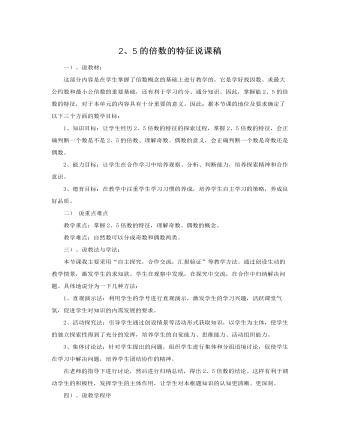
人教版新课标小学数学五年级下册2、5的倍数的特征说课稿
不足之处是: 1 、在如何有效地组织学生开展探索规律时,我认为猜想可以锻炼孩子们的创新思维,但猜想必须具有一定的基础,需要因势利导。在开展探索规律时,我先组织让学生猜想秘诀是什么?由于学生缺乏猜想的依据,因此,他们的思维不够活跃,甚至有的学生在 “乱猜 ”。这说明学生缺乏猜想的方向和思维的空间,也是教师在组织教学时需要考虑的问题。 2 、总怕学生在这节课里不能很好的接受知识,所以在个别应放手的地方却还在牵着学生走。总结性的语言也显得有些罗嗦。 3 、课堂上学生参与学习的程度差异很明显的:一部分学生争先恐后地应答,表现得很出众,很活跃;但更多的学生或缺乏勇气,或不善言辞,或没有机会,而沦为听众或观众。 4 、本节课在教学评价方式上略显单一。对学生的评价少,激励性的语言不够。
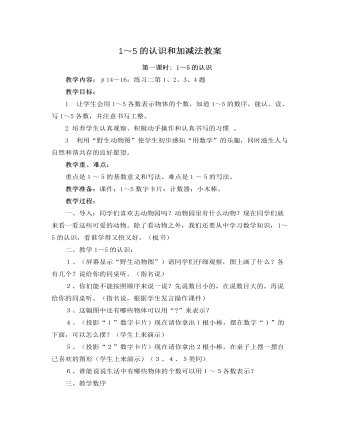
人教版新课标小学数学一年级上册1~5的认识和加减法教案
教学难点:利用数的分解组成,正确地计算5以内的减法。教学准备:小圆片、小棒、小黑板。教学过程:一、复习:1、拍手接力游戏 。2、看图说图意,并列式计算。3、复习5以内数的组成。二、新授:1、(小黑板)出示画图:树上有5只鸟,飞走了一只。根据这幅图,你能提什么问题呢?2、那么你怎么列式呢?先和小组里的小朋友说一说,再指名回答,请学生上来板书列式。3、小组内交流:“5-1”得几?你是怎么算的?和组里的小朋友交流,每个小朋友都说自己的想法,是怎样得出结果的。4、汇报情况:指名小老师上来教大家计算的过程(提倡算法多样化,教师可以有意识请想法不同的学生上来说一说)5、抽象出计算过程:引导学生如果不看图,不数手指,你会计算“5-1”得几吗?(引导学生用数的组成知识来计算)

新人教版高中英语必修3Unit 5 The Value of Money-Discovering Useful Structures导学案
4.They were going to find someone to take part in their bet when they saw Henry walking on the street outside.[归纳]1.过去将来时的基本构成和用法过去将来时由“would+动词原形”构成,主要表示从过去某一时间来看将要发生的动作(尤其用于宾语从句中),还可以表示过去的动作习惯或倾向。Jeff knew he would be tired the next day.He promised that he would not open the letter until 2 o'clock.She said that she wouldn't do that again.2.表示过去将来时的其他表达法(1)was/were going to+动词原形:该结构有两个主要用法,一是表示过去的打算,二是表示在过去看来有迹象表明将要发生某事。I thought it was going to rain.(2)was/were to+动词原形:主要表示过去按计划或安排要做的事情。She said she was to get married next month.(3)was/were about to+动词原形:表示在过去看来即将要发生的动作,由于本身已含有“即将”的意味,所以不再与表示具体的将来时间状语连用。I was about to go to bed when the phone rang.(4)was/were+现在分词:表示在过去看来即将发生的动作,通常可用于该结构中的动词是come,go,leave,arrive,begin,start,stop,close,open,die,join,borrow,buy等瞬间动词。Jack said he was leaving tomorrow.

新人教版高中英语必修3Unit 5 The Value of Money- Discovering Useful Structure教学设计
Step 3 Meaning1. 过去将来时表示从过去某一时间来看将要发生的动作或存在的状态, 常用在宾语从句中。一般由“would/should +动词原形”构成。She hoped that they would meet again someday. 她希望将来有一天他们能再见面。2. was/were going to+动词原形: 表示过去将要发生或很有可能发生的动作, 常用于口语中, 表示预言、意图或者打算等。He was going to start work the following week. 他打算下星期开始工作。3. was/were about to do: 常用来表示即将发生的动作, “刚要/正要做……”。注意该结构不与任何时间状语连用。I felt that something terrible was about to happen. 我感到某种可怕的事情即将发生。4.was/were to do: 表示“曾计划做某事”, 如果表示“本来计划做某事, 动作没实现”, 则需用 “was/were to have done”。She said she was to have told me about the accident. 她说她本来想告诉我关于事故的事。5.Start, go, come, leave, see, meet等动词的过去进行时: 表示就过去某一时刻而言即将发生的动作。She was coming later. 她随后就来。I had just put on my overcoat and was leaving to visit a friend of mine. 我刚穿上外套要去看我的一个朋友。

新人教版高中英语必修3Unit 5 The Value of Money-Listening &Speaking&Talking教学设计
4. A:We’d like to have someone to say a word at the beginning to welcome the group.B:↙Who?A:We thought that you or Dr.Johnson might do it.B用降调说Who,其意思是问,对方想让谁在开场时致欢迎词。Step 6 Pronunciation---Practice1. Listen to the short conversation and mark the intonation with ↗, ↙ or ↙, ↗. Then discuss with a partner what they intend to convey by using different intonation.Owner: You know what ?↗ It’s a million-pound bank note↙.Waiter 1: Really ?↗(question)Waiter 2: Really !↙(unbelievable and surprised)Waiter 3: Really ?!↙↗(first question then surprised)2. Listen to the conversations. Underline the parts that are stressed and mark the intonation. Then talk about the implied meanings of the responses with different intonations. Listen again and repeat.1) Henry: It’s a nice suit.Owner: Oh, it’s perfect!↙(The intonation means it is very suitable for Henry.)2) Henry: Well, that’s very kind of you.Owner: Kind, sir ?↗(what you said is not right) No, it’s kind of you. You must come whenever you want and have whatever you like. Just having you sit here is a great honour !!↙(welcome you to come again)3)Henry:Well, to be honest, I have none. Oliver:(happily) What luck!(excited) Brother↗, what luck!↙(It means “Didn’t you hear it?”)Henry: Well, it may seem lucky to you but not to me!↗(angry) If this is your idea of some kind of joke, I don’t think it’s very funny. Now if you’ll excuse me, I ought to be on my way.↙(If so, I would leave.)Roderick: Please don’t go↙...(hope Henry can wait for a moment)Part B Viewing and Talking---Describe people’s changing attitudes in a film clipStep 1 Before-listening---Tell the filmYou are going to watch part of the film The Million Pound Bank Note. Look at these photos and guess what happens in the film.

新人教版高中英语必修3Unit 5 The Value of Money-Listening &Speaking教学设计
Step 4: Listen again and decide if the following statements are true (T) or false (F).1 It was the first time Chen Liyan's story was reported. T口 F口2 Chen found 10,000 yuan in a small plastic bag in Taiyuan railway station口 F口3 Wang Zheng apologized to Chen because he couldn't offer her more money. T口 F口4 Chen took out a large loan to cure her daughter, T口 F口5 Wang set up a fundraising website for Chen's daughter after Chen told him about her situation. T口 F口Step 5:After listening, discuss the questions.1 What kind of person do you think Chen Liyan is?Chen Liyan is generous and honest because she returned a large sum of money to the owner.2 Did Chen return the money because she didn't need it?No. She returned the money because it was the right thing to do. Evidence for this is that she refused to accept the reward money because she felt that it had not been earned. 3 Is it common for people to do what Chen did?It depends on the culture. In some countries it is quite common to return money that has been found. In other countries, people believe "Finders are keepers!" 4 How did Wang Zheng feel about the return of his money?He must have been very happy and relieved to have gotten his money back. We know this because he thanked Chen repeatedly and even offered her a reward.5 Why did Ma Dongbao tell Wang about Chen's family?He must have had great sympathy for Chen and her daughter and wanted to help them.'We know this because he arranged help for them. 6 How did the news reporter feel about Chen's actions?The news reporter felt that it showed that money wasn't the most important thing in life. We know this because the reporter told us that this is what Chen believes. and then said, “that's a great attitude to take."

新人教版高中英语必修3Unit 5 The value of money-Reading and Thinking教学设计二
? Could you offer me some kind of work here?? I don’t want your charity, I just want an honest job.? Careless: I landed in Britain by accident.Step 7:Consolidation.? Find Henry? Roderick and Oliver were I .making a bet when they saw Henry, a poor young man. ? Know Henry? About a month ago, Henry was sailing and later he found himself carried out to sea by a strong wind. Fortunately, he 2.was spotted by a ship. And it was the ship that brought him to 3.England? Offer money to Henry ? Oliver and Roderick gave Henry a letter and told him that there was money in it. They 4.persuaded him to accept it, and made him 5.promise that it wouldn't be opened until 2 o'clock.Step 8:Language pointsa large amount of: a large quantity of; a great deal ofe.g. They bought a large amount of furniture before they moved their new house.make a bet: make an arrangement to risk money, etc. on an event of which the result is doubtful.e.g. We made a bet on the result of the match.permit sb to do something: allow somebody to do somethinge.g. My mother doesn’t permit me to ride in the street after it rained.by accident: as a result of chancee.g. I only found it by accident.stare at: look at somebody or something with the eyes wide open in a fixed gaze( in astonishment, wonder, fear, etc)to be honest: to tell you the truth; to be franke.g. To be honest, I don’t think we have a chance of winning.Step7 Homework:What do you think will happen to Henry? Will the bank-note help him or get him into trouble?

新人教版高中英语必修3Unit 5 The Value of Money-Reading and Thinking教学设计一
Everybody wants to get wealth.In today’s material world,making money or becoming wealthy symbolizes a person’s success and capability. Many people just make every effort, pay any price to attain greater wealth. With money,they can buy nice, large apartments in nice neighborhood. With money they can own luxurious cars. Wealth seems to bring all happiness in life.But is wealth the only road to happiness? Not really. There are many things in the world, which are beyond the means of money, such as friendship, love, health and knowledge. People are so preoccupied with struggling for money that they have no time or would not take the time to form or maintain friendship. What happiness can they feel living as lonely miserable creatures without love or friends in the world even if they accumulate tremendous wealth?In my opinion, people can’t do anything without money, but money is not everything. What money will bring you depends on your personal belief and goal in life. If you are kind enough to help others, especially the poor, money is a good thing to you. With it, you can do much more for the benefit of people and your country, and it will add to your own happiness. If you want money just for your own needs, you’ll never be satisfied or happy. In a word,you should have money spent for more people. Only then can money be the source of your happiness.Step 8 Homework4 students in a group, one acts Roderick, one Oliver, one servant and the fourth one acts Henry Adams, then listen to the tape, pay more attention to the difference between American English and British English in pronunciation, stress, tone.

新人教版高中英语必修3Unit 5 The Value of Money-Reading for Writing教学设计二
2. 您能看到, 我头发太长了。You can see that my hair is much too long.3. 无论什么时候, 只要您想回来就回来。Please come back whenever you want.4. 您仅有很少的头发要理! You only have too little hair to cut !5. 为您服务是我的荣幸!It is my honour to serve you!Step 9 Writing(Henry is walking down the street when he sees a sign for a place that cuts hair. He decides to have it cut. )H=Henry B=BarberH: Good afternoon, I’d like to have my hair cut, if I may. (The barber looks at Henry’s hair and continues cutting another man’s hair. ) Er, I’d really like a haircut. As you can see it’s much too long. B: (in a rude manner) Yes, I can see that. Indeed, I can. H: Fine, well, I’ll have a seat then. (He sits in one of the barber’s chairs. The barber turns to look at Henry. )B: It’s quite expensive here, you know! Are you sure you can afford it?H: Yes. I think so. (After his hair is cut, the barber tells Henry how much he must pay. Henry shows the barber the bank note. )B: Why Mr. . . (looks shocked)H: Adams. Henry Adams. I’m sorry. I don’t have any change. B: Please don’t worry! (wearing a big smile) Nothing to worry about! Nothing at all! Please come back whenever you want, even if you only have too little hair to cut! It will be my honour to serve you!Step 10 Pair workExchange drafts with a partner. Use this checklist to help your partner revise his/her draft.1. Are all the elements of a play included and in good order ?2. Do the character use suitable language ?3. Are the stage directions clear and useful ?4. Is the plot clear and exciting enough ?

新人教版高中英语必修3Unit 5 the value of money-Reading For Writing教学设计一
【参考范文】Narrator:(Henry is smiling as he leaves the restaurant. As he is walking down the street, he sees a sign for a place that cuts hair. He decides to get it cut. )H=Henry;B=Barber;R=rude manH:Good afternoon, I'd like to get a cut, if I may. (The barber looks at Henry's hair and continues cutting another man's hair. )Er, I'd really like a haircut. As you can see it's much too long. B:(in a rude manner) Yes, I can see that. Indeed, I can. H:Fine, well I'll have a seat then. (He sits in one of the barber's chairs. The barber turns to look at Henry. )B:It's quite expensive here, you know!Are you sure you can afford it?H:Yes. I think so. (In comes the rude man. )R:Hey you there. I need a haircut quickly. Can you do me straightaway?B:All right, then, get in the chair and I'll see what I can do. R:Thank you. (sits down in one of the barber's chairs)H:Excuse me, but I was here first. Aren't you going to do my hair first?B:This man's in a hurry. H:Well so am I!I insist that you cut my hair first. B:OK, but I'll have to be quick. This gentleman is waiting. H:Thank you. (They both become quiet. After his hair is cut, the barber tells Henry how much he must pay. Henry shows the barber the bank note. )B:Why, Mr . . . (looks shocked)H:Adams. Henry Adams. I'm sorry, I don't have any change. R:You're that Mr Adams! Well,I'm glad I waited or I might never have known it was you. B:Why, Mr Adams, please don't worry!(wearing a big smile) Nothing to worry about!Nothing at all!Please come back any time, even if you only need too little hairs cut!It will be my honour to serve you!

新人教版高中英语选修2Unit 5 First Aid-Discovering useful structures教学设计
You have no excuse for not going.你没有理由不去。He was punished for not having finished his homework.他因未完成作业而受到惩罚。2.动词ing形式复合结构由物主代词或人称代词宾格、名词所有格或普通格加动词ing,即“sb./sb.'s+doing”构成。动词ing形式的复合结构实际上是给动词ing形式加了一个逻辑主语。动词ing形式的复合结构有四种形式:①形容词性物主代词+动词ing②名词所有格+动词ing③代词宾格+动词ing④名词+动词ingHer coming to help encouraged all of us.她来帮忙鼓舞了我们所有人。The baby was made awake by the door suddenly shutting.这个婴儿被突然的关门声吵醒了。Can you imagine him/Jack cooking at home?你能想象他/杰克在家做饭的样子吗?无生命名词无论是作主语还是作宾语都不能用第②种形式。Tom's winning first prize last year impressed me a lot.汤姆去年得了一等奖使我印象深刻。Do you mind my/me/Jack's/Jack leaving now?你介意我/杰克现在离开吗?Excuse me for my not coming on time.很抱歉我没能按时来。His father's being ill made him worried.他父亲病了,他很担心。We are looking forward to the singer's/the singer to give us a concert.我们盼望着这位歌手来给我们举办一场演唱会。
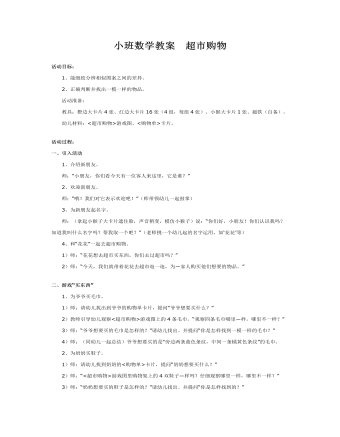
小班数学教案 超市购物
2、正确判断并找出一模一样的物品。 活动准备: 教具:橙边大卡片4张、红边大卡片16张(4组,每组4张)、小猴大卡片1张、磁铁(自备)。 幼儿材料:<超市购物>游戏图、<购物单>卡片。活动过程:一、引入活动 1、介绍新朋友。 师:“小朋友,你们看今天有一位客人来这里,它是谁?” 2、欢迎新朋友。 师:“哦!我们对它表示欢迎吧!”(师带领幼儿一起鼓掌) 3、为新朋友起名字。 师:(拿起小猴子大卡片遮住脸,声音稍变,模仿小猴子)说:“你们好,小朋友!你们认识我吗?知道我叫什么名字吗?帮我取一个吧?”(老师挑一个幼儿起的名字运用,如‘花花’等)
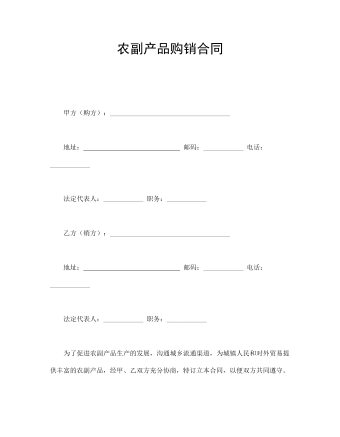
农副产品购销合同
甲方(购方):____________________________________地址: 邮码:____________ 电话:____________法定代表人:____________ 职务:____________乙方(销方):____________________________________地址: 邮码:____________ 电话:____________法定代表人:____________ 职务:____________为了促进农副产品生产的发展,沟通城乡流通渠道,为城镇人民和对外贸易提供丰富的农副产品,经甲、乙双方充分协商,特订立本合同,以便双方共同遵守。第一条 交售日期、数量及价格1.乙方必须在 年 月以前(或 月 旬内),向甲方交售 (农副产品) 斤(担)。2.甲方应按照物价主管部门规定的价格(国家允许议价的,价格由甲、乙双方协商议定),向乙方计付货款。3.甲、乙双方的任何一方如需提前或延期交货与提货,均应事先通知对方,达成协议后按协议执行。第二条 品种、等级、质量及包装1. (农副产品)的品种、等级和质量,按下列第 项执行:(1)按国家标准执行;(2)按部颁标准执行;(3)按地区标准执行;
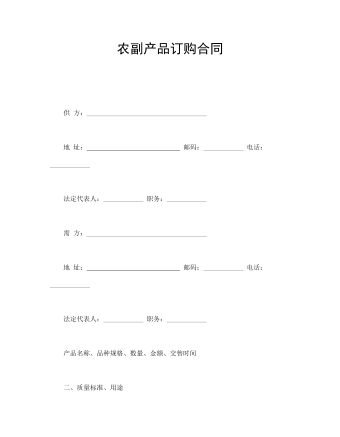
农副产品订购合同
供 方:____________________________________地 址: 邮码:____________ 电话:____________法定代表人:____________ 职务:____________需 方:____________________________________地 址: 邮码:____________ 电话:____________法定代表人:____________ 职务:____________产品名称、品种规格、数量、金额、交售时间二、质量标准、用途
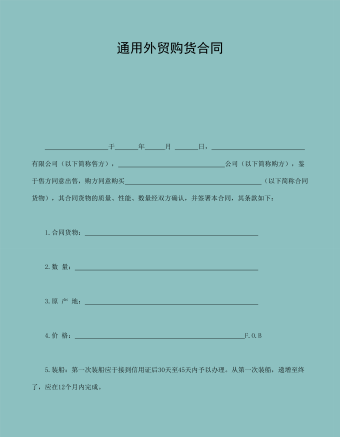
通用外贸购货合同
5.装船:第一次装船应于接到信用证后30天至45天内予以办理。从第一次装船,递增至终了,应在12个月内完成。6.优惠期限:为了履行合同,若最后一次装船时发生延迟,售方提出凭证,购方可向售方提供30天的优惠期限。7.保险:由购方办理。8.包装:用新牛皮纸袋装,每袋为 公斤;或用木箱装,每箱为 公斤。予以免费包装。9.付款条件:签订合同后5天(公历日)内购方通过开证行开出以售方为受益人,经确认的,全金额100%的,不可撤销的,可分割的,可转让的,允许分期装船的信用证,见票即付并出示下列证件:(1)全套售方商业发票;(2)全套清洁、不记名、背书提单;(3)质量、重量检验证明。10.装船通知:购方至少在装货船到达装货港的7天前,将装货船到达的时间用电传通知售方。11.保证金:(1)通知银行收到购方开具的不可撤销信用证时,售方必须开具信用证 %金额的保证金。
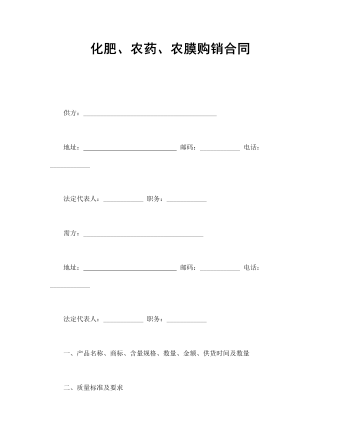
化肥、农药、农膜购销合同
供方:________________________________________地址: 邮码:____________ 电话:____________法定代表人:____________ 职务:____________需方:____________________________________地址: 邮码:____________ 电话:____________法定代表人:____________ 职务:____________一、产品名称、商标、含量规格、数量、金额、供货时间及数量二、质量标准及要求三、供方对质量负责的期限
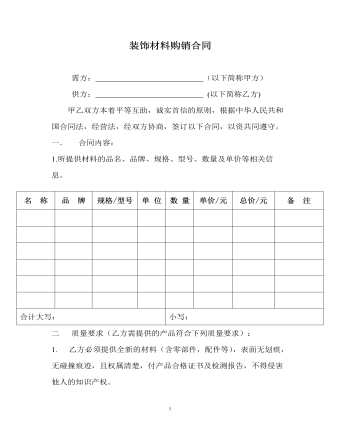
装饰材料购销合同
1.所提供材料的品名、品牌、规格、型号、数量及单价等相关信息。二 质量要求(乙方需提供的产品符合下列质量要求):1. 乙方必须提供全新的材料(含零部件,配件等),表面无划痕,无碰撞痕迹,且权属清楚,付产品合格证书及检测报告,不得侵害他人的知识产权。2. 材料必须符合或优于国家规定的“装饰装修材料有害物质限量”的环境保护标准以及国家和行业规定的其他质量要求,技术指标与出厂标准,做到外观整洁,标识清楚。3. 乙方对其产品包修,包修期为 年,在包修期内出现产品质量问题,乙方应负责三包(包修、包换、包退),所产生的费用由乙方自行承担.包修期满后甲方享有终身成本价维修服务。产品质量出现问题,甲方同时有权解除合同,并追究其经济责任、另选供货商。其他质量要求: 。三 交货时间与地点:1. 乙方负责将材料运送至约定地点,承担相应运输、保管、装卸的费用。并在材料交付给甲方前承担风险责任,甲方在交货地点对数量、外观检查后验收,对材料质量不符合或规格不符的,有违合同原则的产品甲方有权拒收,并由乙方承担因此而产生的经济费用和一切损失。
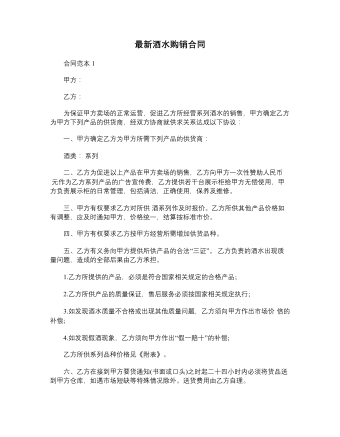
最新酒水购销合同
为保证甲方卖场的正常运营,促进乙方所经营系列酒水的销售,甲方确定乙方为甲方下列产品的供货商,经双方协商就供求关系达成以下协议:一、甲方确定乙方为甲方所需下列产品的供货商:酒类: 系列二、乙方为促进以上产品在甲方卖场的销售,乙方向甲方一次性赞助人民币 元作为乙方系列产品的广告宣传费,乙方提供若干台展示柜给甲方无偿使用,甲方负责展示柜的日常管理,包括清洁,正确使用,保养及维修。三、甲方有权要求乙方对所供 酒系列作及时报价。乙方所供其他产品价格如有调整,应及时通知甲方,价格统一,结算按标准市价。四、甲方有权要求乙方按甲方经营所需增加供货品种。五、乙方有义务向甲方提供所供产品的合法“三证”。 乙方负责的酒水出现质量问题,造成的全部后果由乙方承担。1.乙方所提供的产品,必须是符合国家相关规定的合格产品;2.乙方所供产品的质量保证,售后服务必须按国家相关规定执行;3.如发现酒水质量不合格或出现其他质量问题,乙方须向甲方作出市场价 倍的补偿;4.如发现假酒现象,乙方须向甲方作出“假一赔十”的补偿;